Best Bait For Brown Trout: What Expert Guides Use
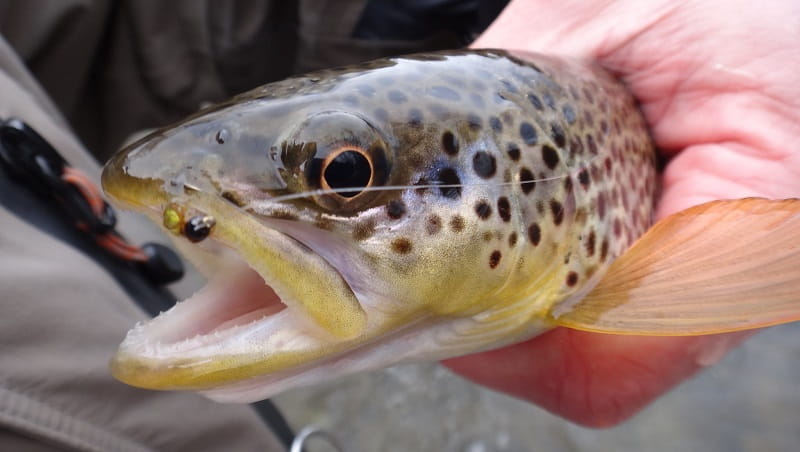
Brown trout is my favorite trout to fish for and I have been fishing for them for over 37 years and guiding for them for over 22 years. As a trout guide who works with and has learned from many other trout fishing guides, my opinion on the best bait for brown trout might differ from the average angler.
There are two types of brown trout baits being recommended online. High percentage baits and low percentage baits.
Both types of bait work. But, knowing which is which is the difference between you leaving the water after catching three brown trout and thinking that you just had a great day of fishing, or you leaving the water with ten brown trout thinking that was a great day of fishing.
The thing is, just because you caught three trout on one bait doesn’t mean that you wouldn’t have caught ten trout if you used a better bait.
The Best Baits For Brown Trout
First, let’s take a quick look at what other anglers are recommending for brown trout bait. If you go on chat groups and look up the best brown trout baits, you will see anglers recommending all kinds of baits, and you will get a list like this.
- Powerbait Dough – Garlic scent or Corn Scent
- Powerbait Mice Tails
- Night Crawlers and Dew Worms
- Salmon Eggs
- Corn
- Marshmallows and dried hard Marshmallows
- Bread – squished hard and rolled into a ball, and molded onto a hook.
- Mad River Trout Worms
- Crickets
- Green Power Eggs
- Powerbait Trout Nuggets
I got this list of baits from a popular chat board.
I will be brutally honest with you. If I took the advice of regular anglers and used the same baits from this list, even with my extensive knowledge of brown trout, I would catch less brown trout! And so will you!
If you ask ten experienced brown trout guides what they think the best brown trout bait is, you will get a list of baits that looks more like this.
- Garden Worms – includes red worms or red wigglers, (not dew worms)
- Live Grubs – which includes typical garden grubs, wax worms, maggots, or mealworms
- Fish Eggs – real salmon or trout eggs, either single eggs or tied into a spawn bag
- Terrestrials – crickets, grasshoppers, beetles
- Minnows – emerald shinners or any local baitfish that 2 to 4 inches long
- Crayfish
- Leeches
- Trout Beads
- Plastic Trout and Steelhead Worms
- Artificial Flies
FYI, that is not in order of best to worst.
Do you see the difference between what experienced anglers use as bait for brown trout versus guys who are not as experienced? Guess who catches the most brown trout?
I don’t know how many times my clients have landed over 20 brown trout when some average guy on the river the same day using corn or Powerbait only catches a few.
Most good trout guides have been experimenting with all kinds of baits under many different conditions for years. They have figured out what baits work the best and which baits are consistently effective.
Why make it harder for yourself using low percentage baits that only work on a small percent of trout, and only work sometimes? Stick to proven baits that the experts use.
I test baits in many ways. I test using good methods and proven setups that work. I test with multiple baits in the water at the same time, and I test in good productive water with plenty of trout, and even still, many of the baits some anglers recommend just suck!
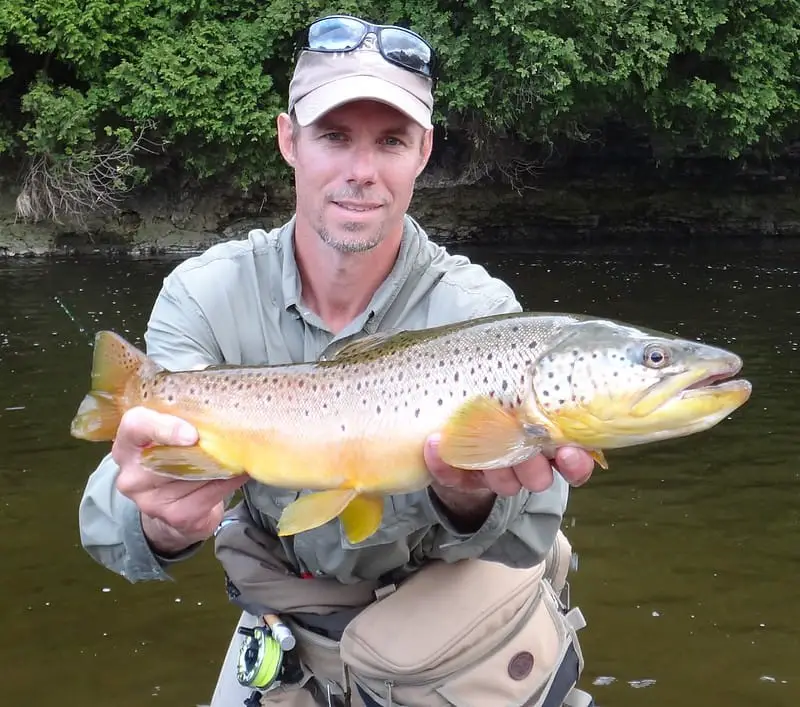
Make Your Baits More Effective
Before you rush out and acquire any of these baits, there are a few things to keep in mind that will significantly improve your chances of catching brown trout on any of those baits.
- Type Of Water: Not all baits are good in all types of water. Some baits are better in faster current water and are not good in still waters of a lake or pond. Know which is which. Some baits are good everywhere.
- Stocked Vrs Wild: Stocked trout and wild trout feed differently, especially for the first week or two after they have been stocked. While Berkely Powerbiat nuggets can be good on freshly stocked trout, large stocked trout that have been in the river for a few years will completely ignore that bait.
- Your Trout Leader Setup: If your leader setup is bad, you will not catch many trout. Even if you have a great bait on the hook, you will still struggle if your leader is not good.
- Hooks: Your hook matters a lot! A hook that is too big or too small, or the wrong type of hook will mean fewer trout will bite and fewer trout landed. Also, how you put the bait on the hook matters.
- Presentation: If you do not present your bait well, or properly based on the type of water, your bait will be far less effective.
- Rotate Baits: Always start with a proven bait first. If you want to try something different or unique, only do so after you have tried multiple good baits first. If one bait is not working, consider changing the size and color before going to a completely different bait. But, don’t keep using a bait that is not working.
A bad setup and poor presentation are the reason why many anglers struggle to catch brown trout even if they use a very good bait in productive areas.
I’ll provide some tips for setups and presentations.
How To Choose Best Brown Trout Bait
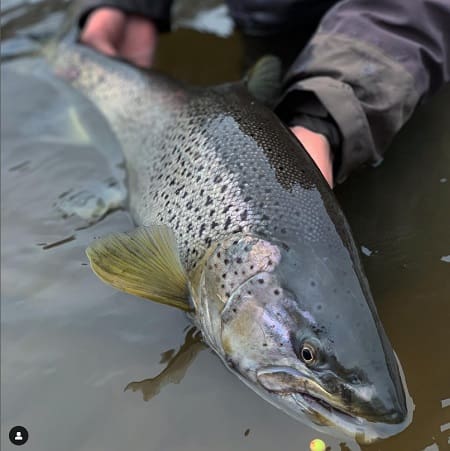
The first thing a guide does before they decide on the best bait is to assess the situation or conditions.
They may consider the time of year, time of day, the activity level of the trout, water temps, the type of water, and the trout’s prevalent food sources.
The reason for this is that guides know that under certain situations, one bait might be more effective than another bait and one setup or method of fishing might also be better.
As an example, I wouldn’t put on a grasshopper onto my hook in the middle of the winter because the chances are better that a small nymph or a single salmon egg that the trout have been feeding on lately would be a more effective bait.
I would also not use a glass or plastic trout bead suspended from a bobber in a lake or pond. A bead has no scent and it’s hard and in a lake the trout have plenty of time to inspect the bait, so the chances of a trout biting it are low, and the chances of a trout holding on to it are also low.
But in a river with a fast current, the trout needs to make a quick decision to grab a passing bead, and the pull from the current often sets the hook for you, which is why I catch a lot of brown trout on beads in the river.
For lakes, use live baits, dead baits, or soft baits with scent.
In rivers with slow to fast currents, just about any bait will work, but smart anglers will always use high-percentage baits first. High percentage baits are the guide baits listed above.
How To Fish Bait Effectively
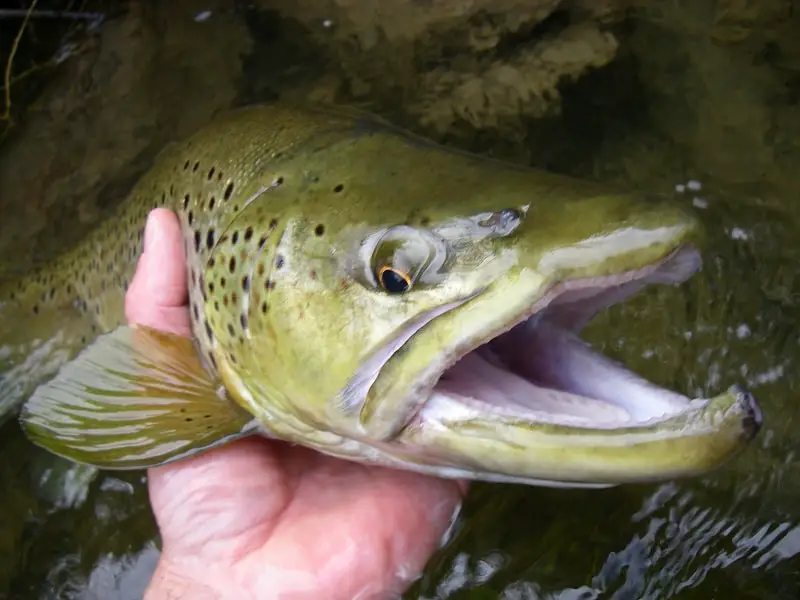
Trust me, I see guys fish good baits poorly all the time, and the results are always the same. Far fewer fish than I would have caught!.
Methods For Bait Fishing
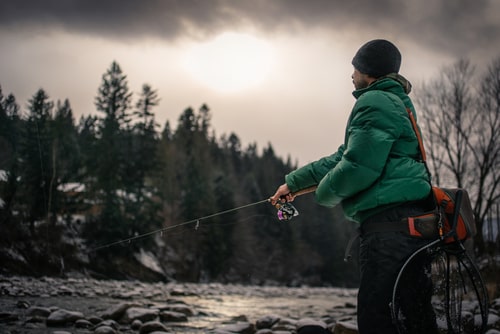
Something every guide does before they start fishing any bait for brown trout is to determine the best method for that section of the river.
As an example, if the river in front of you is all pocket water that is 12″ to 30 inches deep, bottom bouncing will be a lot more effective than fishing a bait below a float.
But if you walk into a nice pool with a moderate current and decent depth of over 4 feet, float fishing or drift fishing is likely the better way to go.
If you fish still in water in a lake or a pond the best methods will be float fishing or the still fishing method known as plunking.
Set Up For Bait Fishing
The setup for the method that you are using is a critical part of fishing your bait effectively. Trout can be line-shy, hook-shy, and float-shy. This means if they see any of these things they might refuse your bait and even be spooked enough that they will stop feeding for hours.
To me and many other river guides, this is common sense, which is why we make sure our bait rig, which includes the leader, hook, weights, and maybe a float, is one that is proven to be effective.
I have said this many times before: ” Your bait is the least important thing when it comes to catching trout in a river.”
Presentation Is Key
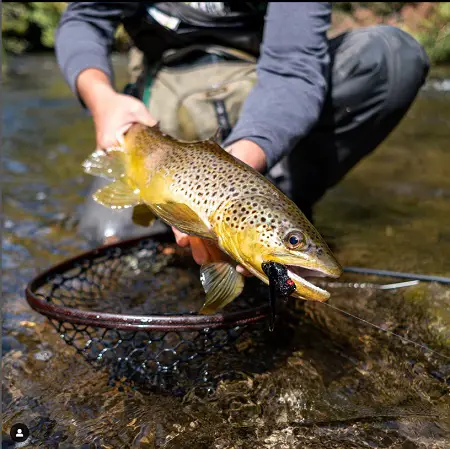
It is very important to present your bait in a way that is natural to the trout, and you need to do this each time your bait enters the water.
Most guides will tell you that presentation is critical.
There is a reason why river guides catch more fish than most people, even when they use the same bait. Their strategy for catching more fish isn’t that hard.
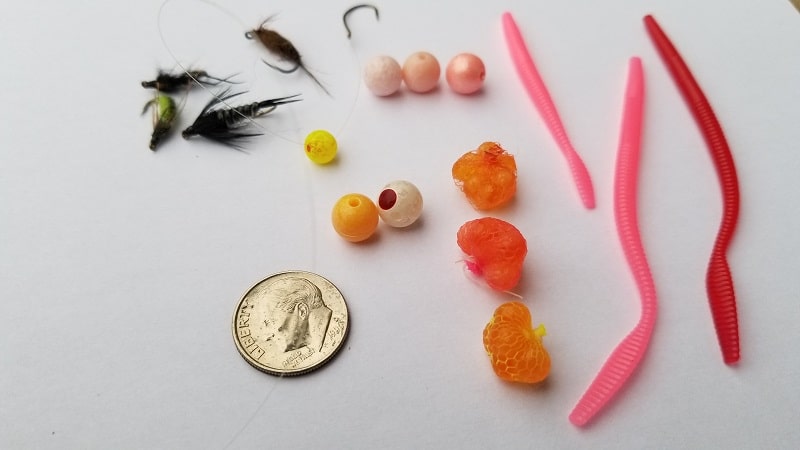
Know which bait is good at that time based on the conditions, know which method will be the most effective based on the water, put the bait on a great setup and a proven hook, and then fish it really well.
And if it doesn’t work, try a different baits until you find one the trout want. That’s it, it’s simple!
Stealth
Let’s talk about stealth and approach because I’ll be honest with you, it makes a huge difference.
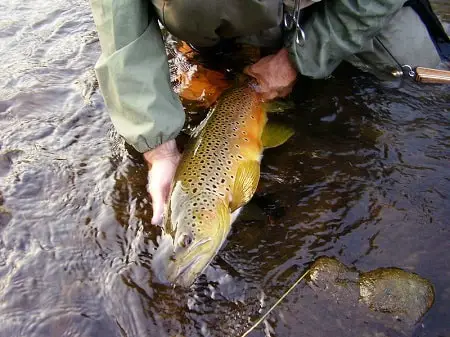
Use you could have the best bait on a proven leader setup, with the perfect hook, and you could make a perfect presentation, but if you make too much noise or you are seen by the trout they will likely go lock-jaw and then ignore every bait you throw at them.
Being noisy or being seen means your bait is practically useless except for maybe a bunch of dumb little trout that will eat even if you are standing on top of them. “Don’t be that guy!”
Artificial Flies As A Bait
The reason that I think artificial flies like the ones that fly anglers use are one of the best baits in rivers is that these flies imitate the aquatic insects that are found in the river year-round.
These same aquatic insects are recognized by brown trout as a valuable and ongoing food source.
I have put thousands of large trout, some over 26 inches in the net, that were caught on tiny flies.
Flies can also imitate other types of insects or food sources such as beetles, bees, moths, crickets, grasshoppers, baitfish, mice, or the many other insects that live near the river.
You do not need to be a fly angler to use flies since flies can be used with both bottom-bouncing methods and with float fishing. Click the link if you want to see how I use flies with spinning gear and the setups that work the best.
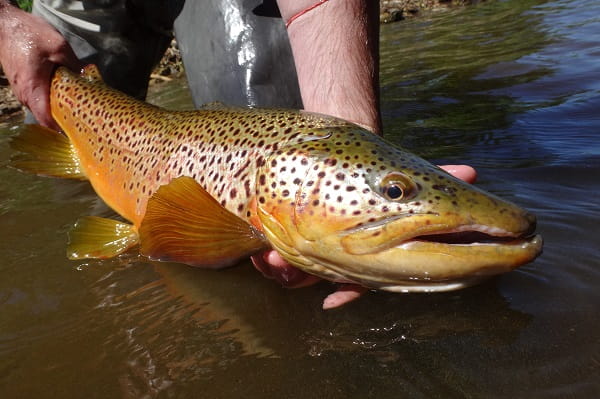
Stonefly, midges, and Mayfly species like the tiny Blue Winged Olive are active during the winter and early spring. In the winter, I will use smaller flies in sizes 16, 18, and 20. During later spring through the fall, I will use some larger sizes and my flies will range in size from 6 to 14, but smaller sizes will still work at times.
The most effective flies that I use for trout are:
Flies like the Pheasant Tail Nymph, Frenchie / Hot Spot Pheasant Tail Jig Fly, and the Davie’s Polish Pheasant Tail Nymph.
Other Great Trout Flies Include:
- Walts Worm and Sexy Walts Worm
- Diamond Dub Scud or the Humps Cress Bug used by guide George Daniel
- Rainbow Warrior
- Prince Nymph
- Lightning Bug Nymph
- Bead Head Black Stonefly
- Tungsten Micro Wooly Bugger – White, Black, and Olive are my most effective colors in sizes 10 and 12.
- Tungsten Jigged Prince Nymph – One of my most effective patterns in the spring and early fall. Size 10 or 12.
- Tungsten Duracell Jig Head Fly
- Tungsten Jigged Caddis
- Tungsten Bead Frenchie Jig Fly
These are primarily nymphs, but dry flies and streamers can be very effective and I show you 29 of my best patterns with some unique patterns you probably haven’t seen yet and some tips that work very well for me.
Worms Are Great For Brown Trout
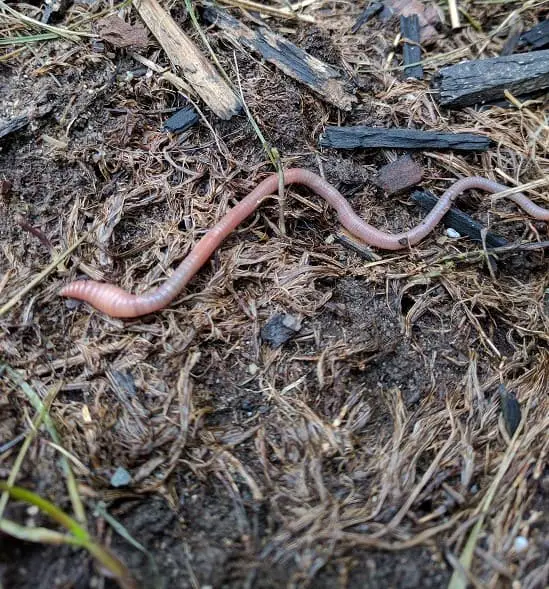
The worm is often great for brown trout in any type of water, and it is readily available.
The thing with worms is they tend to be seasonal and fish best in the spring. However, it never hurts to fish a worm at any time of the year.
I find that smaller 2 to 4-inch garden or red worms work much better than large 7-inch or bigger dew worms.
It is always smart to have either real or fake worms on you when you fish for brown trout. Just make sure worms are not your only bait.
Also, learn how to rig and fish worms properly. Don’t be one of those guys that take huge dew worms, break them in half, or use them full size and then ball them up on the hook because those guys rarely catch any good size wild trout.
Honestly, hooking and properly presenting a worm makes a huge difference. You can see how to do this well on my page Fishing With Worms For Trout and Steelhead: 10 Guide Tips.
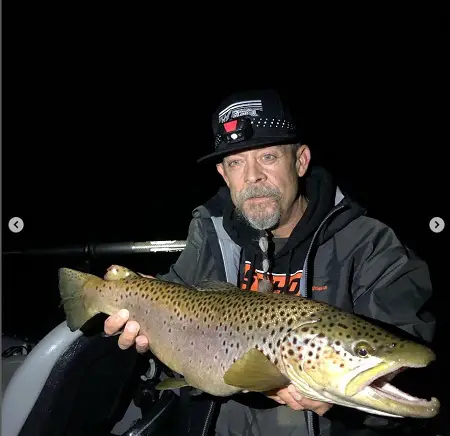
Guide Tip: Live worms are also one of my most effective baits for night fishing for trophy-size brown trout and brook trout in the dark.
I now fish plastic worms 95 percent of the time and when fishing in the current I find plastic worms work equally as well as live worms, except that the plastic worms are more durable and rarely fall off and they are much easier to pack into a vest or fishing pack than real worms.
these are some of my favorite artificial worms.
Berkley Trout Worms
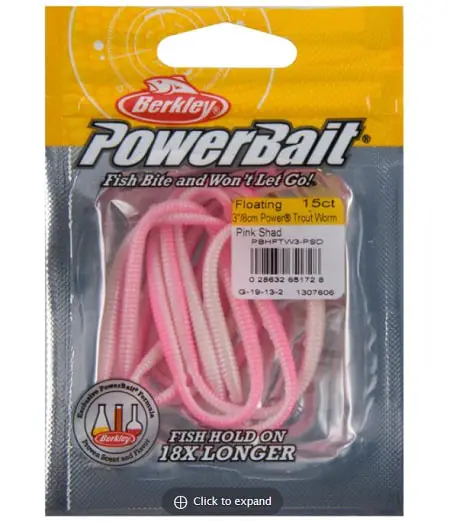
Berkley Gulp Earthworms / Red Wigglers
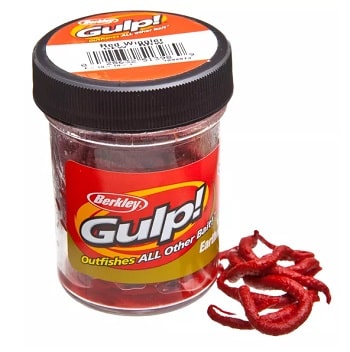
Berkley Gulp! Alive! Angle Worms
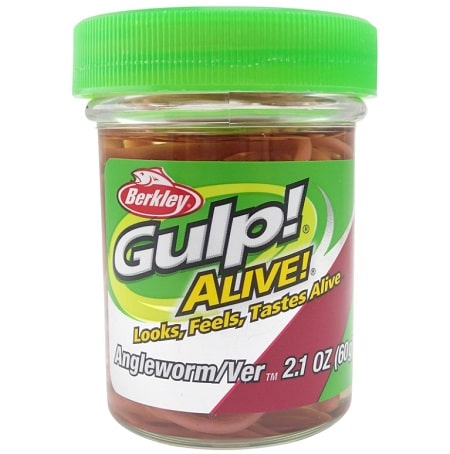
Eggs Are One Of The Best Baits For Brown Trout
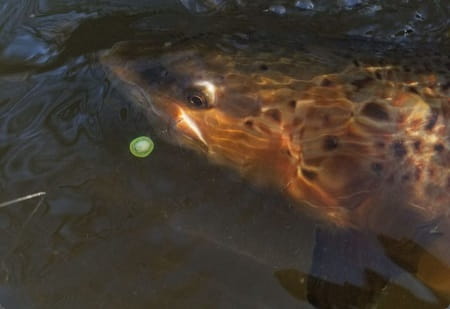
Egg baits are either spawn sacs, single salmon eggs, beads, or artificial egg baits. Even skein can be a very effective bait for brown trout.
Egg baits can be seasonal and eggs are often great in the fall and spring when there are rainbow trout, other trout, or other fish like suckers spawning in the river.
Eggs are often drifting in the current during the spawn and brown trout will gorge on them without hesitation.
Rigging your eggs, and knowing the right sizes and colors can pay off with a lot more and bigger brown trout. Spawn Bags – Guide Secrets For More Trout And Steelhead and at Bead Fishing For Trout – Easy Guide Secrets
Grub-type Baits For Brown Trout
Baits like grubs, mealworms, maggots, and wax worms can be excellent baits for brown trout, especially from spring to early fall. You find them at your local fishing store or at your local pet store since people use them for their pet reptiles.
You could also choose the imitation plastic grubs like the Berkely Power Wigglers which can usually be found at your local fishing store or online.
Be sure to use the correct hook sizes like a size 10 to 14 hook.
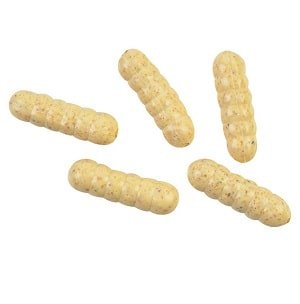
Power Wigglers
Berkley PowerBait Power Wigglers are a great grub/maggot imitation.
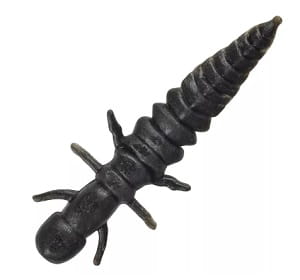
Lil Hellgrammites
Plastic Nymphs like this 2″ Lil Hellgrammites can be good in rivers.
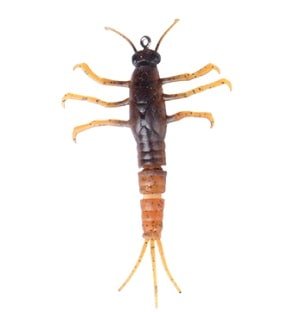
Savage Nymph
This 2-inch Savage Gear plastic nymph is good in rivers.
Leeches And Crawfish Are Good Baits For Brown Trout
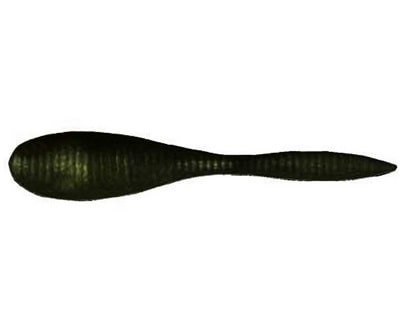
I have seen huge brown trout nosing into the rocks looking for crawfish, and I have seen them smash a well-presented live or fake leech, so these types of baits are great for both big and small brown trout.
One of my favorite baits is the Berkely Gulp Leach
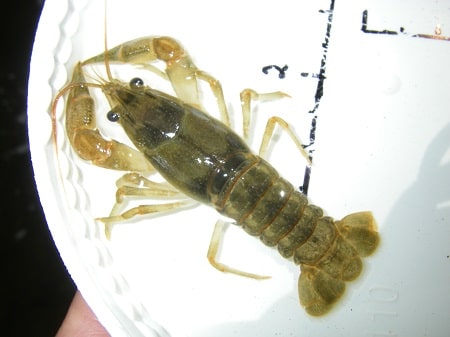
The other great thing about leeches and Crayfish is that they live in rivers and lakes so they are there year-round which means these are good baits for brown trout almost any time of the year.
For Crayfish, I prefer 1 to 2-inch live or fake ones. If you use crayfish hook them once through the tail with a size ten wide gap hook such as the Raven Specimen hook.
For leeches, 2 to 4-inch leaches are great sizes for most brown trout.
Minnows And Baitfish
Minnows and other baitfish are probably the bait that I use the least for brown trout, but that is only because they are so hard to carry with you and the other baits above are usually more than enough.
Most of the time I prefer to use imitation minnows like the Berkley Gulp Alive minnows. They have a scent that attracts fish, they have good movement in the current, and they hold on to the hook well. They also come in some great colors and their size is perfect.
Tight Lines,
Graham
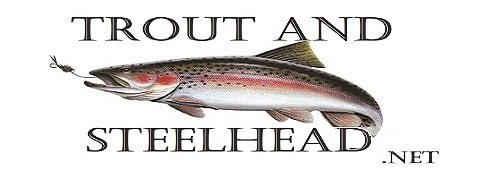
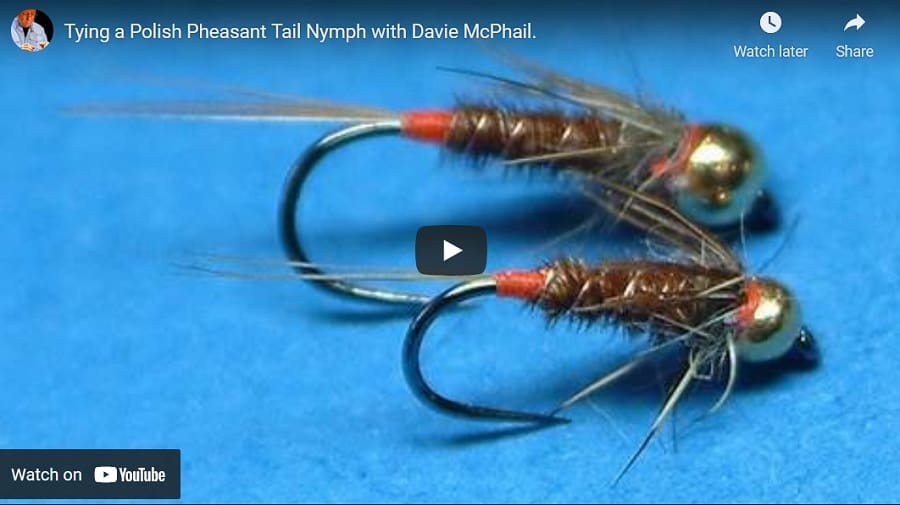
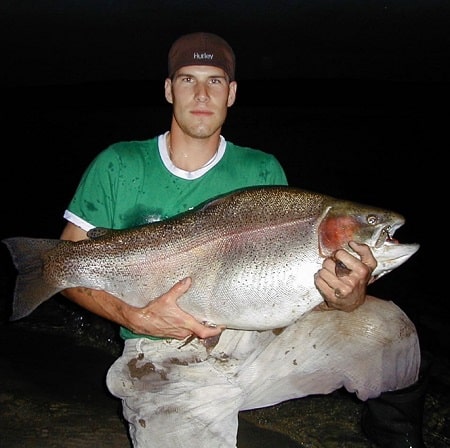
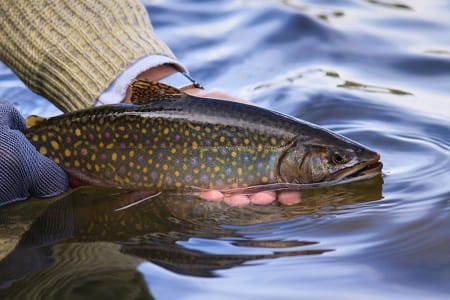
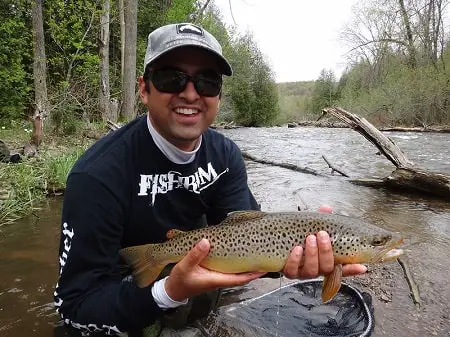
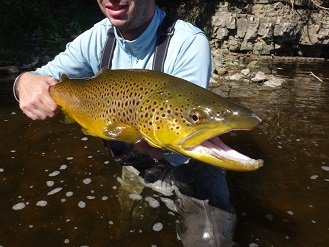
Great information. I never thought that it depends on the time of year on what fish eat. Also your comment on plastic worms. Great idea. Alan from Scio Oregon